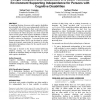Free Online Productivity Tools
i2Speak
i2Symbol
i2OCR
iTex2Img
iWeb2Print
iWeb2Shot
i2Type
iPdf2Split
iPdf2Merge
i2Bopomofo
i2Arabic
i2Style
i2Image
i2PDF
iLatex2Rtf
Sci2ools
CHI
2008
ACM
2008
ACM
Design, adoption, and assessment of a socio-technical environment supporting independence for persons with cognitive disabilitie
A significant fraction of persons with cognitive disabilities are potentially able to live more independently with the use of powerful tools embedded in their social environment. The Memory Aiding Prompting System (MAPS) provides an environment in which caregivers can create scripts that can be used by people with cognitive disabilities ("clients") to support them in carrying out tasks that they would not be able to achieve by themselves. To account for the great diversity among clients, MAPS was developed as a metadesign environment, empowering the caregivers to develop personalized prompting systems for the specific needs of individual clients. This paper is focused on the lessons learned addressing adoption, learning, use, and abandonment of sociotechnical environments fitting the unique needs of people with cognitive disabilities. Author Keywords Cognitive disabilities, independence, socio-technical environments, meta-design, end-user development, distributed intelligenc...
CHI 2008 | Cognitive Disabilities | Human Computer Interaction | Keywords Cognitive Disabilities | Personalized Prompting Systems |
| Added | 30 Nov 2009 |
| Updated | 30 Nov 2009 |
| Type | Conference |
| Year | 2008 |
| Where | CHI |
| Authors | Stefan Carmien, Gerhard Fischer |
Comments (0)

